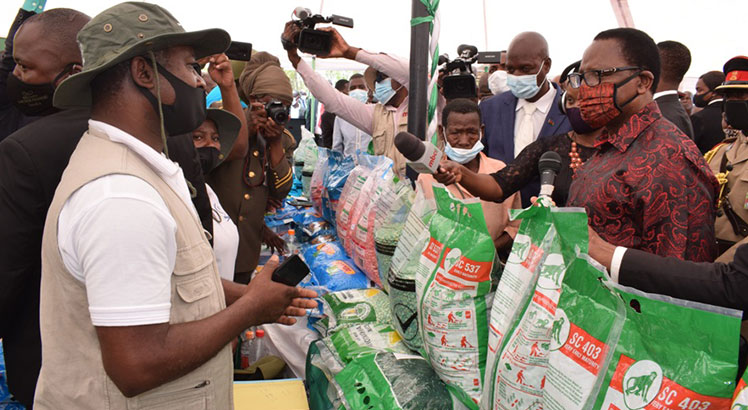Farmers to pay more for AIP
Ministry of Agriculture says rising global prices of inputs, especially fertilisers, will likely see farmers paying more than the K7 500 they paid last year to redeem inputs under the Affordable Inputs Programme (AIP).
Minister of Agriculture Lobin Lowe gave the indication on Friday during the launch of construction works for Northern Cluster Irrigation schemes at Marko Irrigation Scheme in Traditional Authority Mwabulambya in Chitipa.

He said his ministry will soon start scrutinising bids for suppliers, but indicated that prices for fertiliser will likely go up due to the devaluation of the kwacha and global prices of the commodity.
Said Lowe: “If you consider procurement procedures, you will appreciate that we have tendered and suppliers have submitted their bids. Very soon we will be evaluating them [the bids]. We are also going up and down to make sure that potential suppliers can indicate the pricing.
“The Ministry of Agriculture can’t be spared the impact of devaluation and even the global market of fertilisers. We are monitoring and I can’t predict the prices as of now. We know and have seen fertiliser prices going up, and the price of fertiliser won’t be the same.”
The minister encouraged farmers to also use manure on their farms.

Lowe said: “But I must say to farmers that as we depend on fertiliser, let us also try manure. As we see prices of fertiliser going up, as farmers we may harvest using other means like manure.”
On the domestic market, retail prices for fertiliser have gone up by about 90 percent from K22 042 per 50 kilogramme (kg) bag in August 2020.
Spot-checks conducted by The Nation last month in some agro-dealer shops showed that a 50kg bag of Urea and CAN were fetching K49 000 and K37 700, respectively.
On the other hand, Super D was selling at K62 700 while Compound D was at K52 700.
The Malawi Agriculture Policy Advancement and Transformation Agenda (Mwapata) Institute earlier warned that Russia’s invasion of Ukraine will increase fertiliser prices further because Russia is the world’s fourth largest producer of main ingredients for chemical fertilisers. Ukraine and Belarus are also among the top 20 producers of chemical fertilisers.
Collectively, these three countries produce about 10 percent of the world’s nitrogen and phosphorus fertilisers as well as 35 percent of the world’s potassium.
In its March 2022 Policy Brief Number 18, Mwapata said: “The world is likely to see an eight to 10 percent reduction in the supply of fertiliser on the global market in the coming year, perhaps more for those which include potassium that will further add to the cost of fertiliser in Malawi, which has already risen.”
Fertiliser Association of Malawi data shows that in the past five years, the annual fertiliser market in Malawi is between 350 000 to 370 000 metric tonnes (MT).
Following the launch of the AIP which almost quadrupled the number of beneficiaries to 3.6 million from 900 000 under its forerunner, the Farm Inputs Subsidy Programme, the requirement has increased to between 400 000 and 450 000MT.
In the 2020/21 growing season, 345 710MT of fertilisers were sold under AIP.
In an earlier interview, Farmers Union of Malawi chief executive officer Jacob Nyirongo said the increased fertiliser prices will stretch the national agriculture budget and reduce production.
He said: “Unfortunately, the government has very limited options to remedy the increasing fertiliser prices. This is the case because Malawi is at the tail end of the fertiliser supply chain; hence, has no significant power to influence any shift in fertiliser price movements.”
However, Nyirongo said to lessen the damage, the government should purchase some of the AIP fertiliser now as there are strong indications that fertiliser prices will continue to rise.
Agriculture policy analyst Tamani Nkhono-Mvula said the rising prices are not a good sign at all for Malawi as we rely so much on fertiliser.
In the 2022/23 National Budget, AIP has claimed K109.5 billion, representing about 85 percent of the agriculture sector budget. The allocation is a K33 billion decline from the previous year’s K142 billion allocation.





